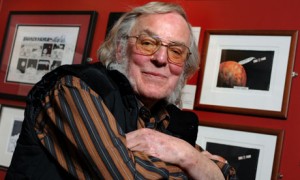Professor Colin Pillinger, the man behind the British-led Beagle 2 mission to Mars, is making a star appearance in his hometown of Bristol for a lecture looking at what can be learned from Martian meteorites.
Prof Pillinger has spent 40 years analysing and writing about extraterrestrial objects – a career in which he has found tantalising evidence of life on Mars.
He will draw on his experiences of meteorites at a public lecture next Thursday entitled Stones from the sky: a heaven-sent opportunity to talk about science, which is organised by the University of Bristol in association with the Royal Society.
The talk will begin with the story of the earliest-recorded British meteorite, the Wold Cottage stone, which fell in Yorkshire in 1795, before looking at how unassuming lumps of rock allow scientists to study the places beyond Earth that they cannot physically reach.
Meteorites are useful to scientists because they reveal a lot about the planet from which they came and, if from the asteroid belt, can even provide insights into the early Solar System.
Studying Martian meteorites led Prof Pillinger to discover that there had once been water on the planet. The same meteorites also showed deposits of carbonate minerals and what appeared to be organic matter.
Prof Pillinger has close links with Bristol, having been born in Kingswood in 1943 and educated locally until embarking on a chemistry degree at University College Swansea, where he went on to achieve a PhD in Mass Spectrometry.
He subsequently returned to the city to work as a research associate at Bristol University from 1968 to 1976.
He is best-known as being the principal investigator for the Beagle 2 Mars lander project, part of the European Space Agency’s 2003 Mars Express mission. He conceived the mission after finding exciting evidence of life on Mars while analysing the meteorites.
Beagle 2 reached Mars in December 2003 but failed to make contact with Earth after it was released from the orbiting probe and entered the red planet’s atmosphere.
The Royal Society Michael Faraday Prize Lecture is Thursday March 22 at 6 pm in The Great Hall, Wills Memorial Building, Queen’s Road.
The lecture is free but booking is required at http://www.bristol.ac.uk/pace/public-lectures/pillinger.html































